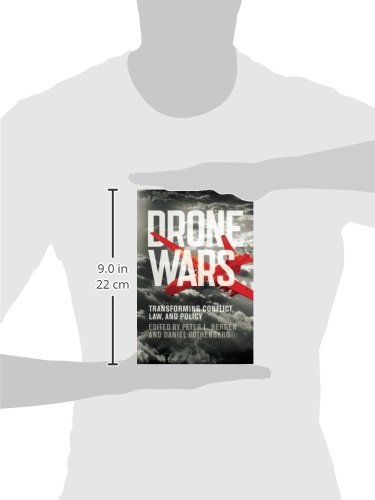Customer Services
Copyright © 2025 Desertcart Holdings Limited




Full description not available
J**.
Drone Wars: An Excellent Collection
Drone Wars is a rich collection that offers the latest in the growing scholarship on drone warfare.The book casts a wide net in terms of subject matter. One wonders how, even with the obvious interrelationship between its sections, the editors can keep the volume from reading like a piecemeal collection. But the book benefits from a shrewd organizational choice – each of the book's four sections begins with brief personal narrative accounts – and these help the book to hang together well.These first-person descriptions of drone warfare range from the perspective of civilians on the ground to the experience of drone operators themselves. Journalist David Rohde authors the book's leading chapter, where he gives an account of his time as an imprisoned abductee under the control of the Taliban in the Tribal Regions of Pakistan; parts two and three of the book begin with stories from drone operators, and a particularly compelling chapter offers a glimpse of drones’ impact on a shopkeeper's life in North Waziristan, Pakistan. These views “from the ground” offer insightful glimpses inside the lives and minds of those who operate drones and those who feel the effects of their operation. While similar (and more detailed and in-depth) accounts of such experiences exist in the popular press and in the reports of NGOs and international organizations, the inclusion of these accounts is refreshing; too often academic discussions of drones can tend to be abstract and distant – the editors did well by reminding the reader of the human “face” that is impacted by drone use, drone policy, and the relationship between drones and international law.Moreover, part one of the book, “Drones on the Ground,” is one of the best collections of articles detailing the impacts that drones have on noncombatants. Drawing from the New America Foundation's (NAF) data set of drone strikes, Bergen and Rowland's chapter, “Decade of the Drone: Analyzing CIA Drone Attacks, Casualties, and Policy,” offers a detailed look at the “numbers.” But despite the good work that organizations like the NAF have done in compiling statistics such as the number of civilian casualties and the targeted killing of militants, the authors' conclusion that “what is needed is greater openness and transparency” is a stark reminder of just how nontransparent the US's drone program remains (31).This is a timely book, impressive in its breadth, with a notable collection of authors who range from former high-ranking US government officials and public policy specialists to academics and experts in international law. This book will appeal to those looking for a volume that addresses some of the major debates surrounding drone warfare as it is being carried out presently.
H**M
Very Weak Anthology of Issues Surrounding Use of Drones
This is a very weak anthology of essays, most by American journalists. For the most part, it is an extended rehash of work by the New America Foundation. Of several studies of drone warfare (especially Stanford/NYU's and The Bureau of Investigative Journalism's), the New America Foundation's is by far the most friendly to the US. Co-editor Peter Bergen and contributor Jennifer Rowland co-author an atrociously bad essay that might as well have been written by the Obama administration. David Rohde and Sarah Holewinski provide decent essays. Most of the material has been better explored in other books (e.g., by Scott Horton, Jane Mayer, Jeremy Scahill, and Andrew Cockburn) and in The New Yorker, The Guardian, and The Intercept. Scholars like Georgetown law professor David Cole and Andrew Bacevich, among others, have also examined the issue. There is a lot out there. The catch is you may have to do some work to find it. But this book doesn't do the work.There is absolutely nothing that merits publication by a major university press. There is no evidence at all of peer review. The book is riddled with significant omissions. For example, Bergen and Rowland show no awareness at all of major studies that preceded the book. That's an enormous issue when some of those studies directly undermine claims the authors make. In a similar vein, there is little awareness in evidence of the history of high-technology warfare, which precedes the war in Vietnam by decades.All in all, one of the worst books I've personally seen come out of the Cambridge University Press. Two stars instead of one only because there are a few essays that are worth reading.
B**N
Perfect condition
Absolutely stunning example. Thank you for a great deal
A**S
Law, policy and the Paradigm Shift with Drones
This is one of the best current sources of overall background in the challenges facing policy makers, the international legal profession and the military forces around the world. If you want to understand drones and the complexities of use for society, then look no further. Highly authorititive and well written, evidence based and great at provoking thought. Highly Recommended.
E**7
Brilliant and informative
Fantastic book and exceptionally helpful for studies of subject matter
A**D
Very Good
Very Good
Trustpilot
2 weeks ago
2 weeks ago